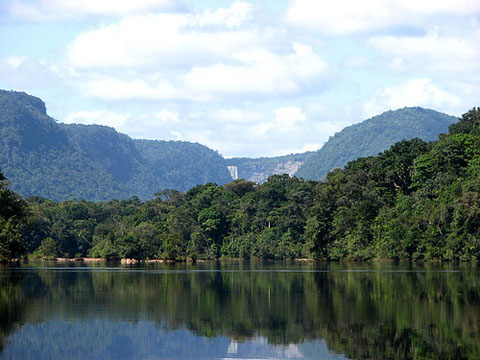Lower Potaro River, Guyana, with Kaieteur Falls just visible in the distance. Photograph by Nicholas Laughlin
Deeply influenced by the “mythic method” of high modernists like Eliot and Joyce, Harris set out to redescribe his society sub specie eternitatis — through the lens of an historical consciousness which reached back several centuries and encompassed the racial memories of Europe, Africa and the Americas. The conventions of traditional fiction, which tended to dwell on the surfaces of things, simply could not do this. So Harris forged a style that let him delve into the interior life of a country that was both ancient — if seen as part of the continental land mass — and, paradoxically, in its political infancy as it emerged from the clutches of its colonial master. Eager to restore the lost perspectives of a landscape he had mapped as a professional surveyor, he had the intellectual courage, and chutzpah, to fictionalize his visionary intuitions without yielding to the lure of simplification.
Prodigiously well read, and dauntingly familiar with Marxist and Existentialist thought, Harris referred unblushingly to Heideggerian dasein and geworfenheit, and to “absent presences” in the national soul. Far from being pretentious or obscurantist, these concepts translated the struggle of the West Indian artist into language that could be understood on a world stage. C.L.R. James and Derek Walcott held similarly panoptic views of European culture, and they also possessed the intellectual confidence to respond to it on their own terms. In fact, his novels and cultural criticism fit squarely into a literary vision of the Caribbean shared by both of these men, and in some instances he even seems to have helped pave the way for their success.
— From “The Lost World of Wilson Harris”, the elegiac editorial in today’s Stabroek News, reflecting on the recent news of Harris’s knighthood, the immense creative ambitions of a previous generation of Guyanese and West Indian writers, and today’s “diminished cultural expectations.”





